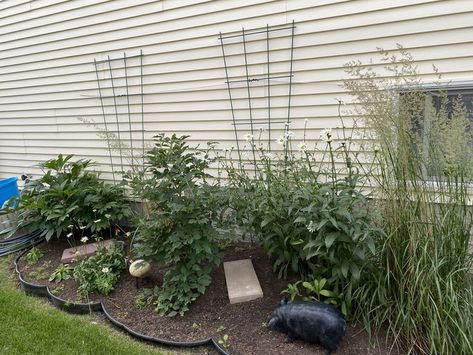
This is my favorite time of year.To be outside in the yard and transforming it into a place of beauty. Nothing is too hard when I begin full of enthusiasm and bright ideas. My huge project this year is transforming a chainlink dog run into a gazebo. The chainlink is going to have flowering vines growing up the sides and provide a lovely little getaway. So far I have Hops, Morning Glory, Sweet Peas,and Scarlet Runners seeds planted.It is challenging but in my mind I can see it so I will share with you how it turns out. I use the oils in my gardening and have had great success in keeping it holistic.
In the heart of every gardener beats a desire for a flourishing flower garden, radiant with color and life yet free from the grasp of harmful chemicals. The appeal of holistic gardening transcends the mere beauty of blooms; it nurtures a sanctuary for bees, augments our well-being, and safeguards our planet's delicate ecological balance. By harnessing the power of nature – specifically, essential oils – we can foster a vibrant, healthy garden that thrives in harmony with the environment. Welcome to the art of holistic gardening, where the essence of nature coalesces with our passion for green spaces, especially within the challenging zone 3 climates.
**The Foundation of Holistic Gardening**
Creating a chemical-free gardening journey begins with understanding the ecosystem you're cultivating. Holistic gardening advocates for a balanced approach, from soil health to the diversity of plant life, ensuring that every element contributes to a thriving garden.
1. **Soil is the Soul**: Begin with enriching your soil. Composting is a fantastic way to add nutrients naturally. Incorporate essentials oils like lemon and peppermint by adding a few drops to your compost mix to enhance decomposition and deter pests.
2. **Diverse Planting Is Key**: Plant a variety of flowers that bloom at different times to provide continuous nectar for pollinators. Lavender, with its calming scent, is not only hardy in zone 3 but also a magnet for bees and beneficial insects.
3. **Companion Planting for Protection**: Certain plants, when grown together, naturally protect each other from pests. Marigolds, for example, repel garden nuisances and their vibrant orange and yellow blossoms add cheer.
**Essential Oils: Nature’s Answer to Garden Pests**
Turning to essential oils as a natural pest deterrent is not only effective but also elevates the sensory experience of gardening. Here are a few recipes to arm your garden against common critters:
- **Peppermint Oil Pest Spray**: Mix 10-15 drops of peppermint oil with water and a small amount of mild organic soap in a spray bottle. Peppermint deters aphids, spiders, and even rodents. Spray gently on affected plants.
- **Citrus Bliss Repellent**: Combine a few drops each of lemon and orange essential oil with water and a dash of neem oil in a spray bottle. This concoction works wonders against chewing insects and provides a refreshing citrus aroma to your garden areas.
- **Lavender Lace Bug Deterrent**: Lace bugs detest lavender. Blend 10 drops of lavender oil with water and a teaspoon of witch hazel. This not only keeps lace bugs at bay but also invites pollinators to your space.
Remember, when applying any essential oil spray, do so during the cooler parts of the day (early morning or late evening) to avoid harming beneficial insects or causing leaf burn.
**Encourage Pollinators and Build Ecosystem Harmony**
A chemical-free garden provides a safe haven for bees, butterflies, and other vital pollinators. Beyond planting pollinator-friendly flora, consider these tips:
- **Bee Baths**: Fill a shallow dish with water and stones for bees and butterflies to land and hydrate.
- **Butterfly Buffet**: Incorporate milkweed and other butterfly favorites. Not only do they serve as a food source but also as breeding grounds for monarch butterflies.
- **Habitat Hedging**: Use local shrubs and trees to create protective areas for wildlife. This not only adds beauty and privacy but supports the local ecosystem.
**Holistic Gardening: A Way of Life**
Adopting holistic gardening practices extends beyond creating a beautiful garden; it's a commitment to living in harmony with nature. Zone 3 gardeners, with their shorter growing seasons and cooler temperatures, can achieve vibrant gardens full of life, color, and joy, without relying on harsh chemicals.
By implementing the strategic use of beneficial plants, enriching soil naturally, and utilizing the power of essential oils, you're not just growing flowers; you're nurturing a sustainable ecosystem that respects the delicate balance of nature. In doing so, we not only enhance our own well-being but contribute to a healthier planet, one garden at a time.
Remember, the path to a flourishing, holistic garden is a journey of learning and growth. Be observant, be patient, and most importantly, connect with the earth. Your flower garden is more than a space of beauty; it's a vibrant, living sanctuary that reflects your care, dedication, and respect for nature's exquisite harmony.


